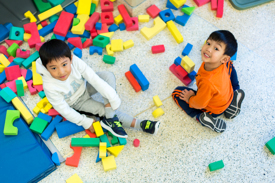Play for Fun and Play for Learning: What Science Tells Us
Karin Lifter
Tuesday, 09 Apr 2019 at 7:00 pm – South Ballroom, Memorial Union
Karin Lifter is an early intervention specialist and a professor in the Department of Applied Psychology at Northeastern University in Boston. She directs the Interdisciplinary Certificate Program in Early Intervention, which prepares personnel to serve infants and toddlers with disabilities or at risk for developmental delay as well as their families. Lifter conducts both descriptive and intervention studies on the play, language, and social development of young children with and without disabilities, bridging cognitive and behavioral theories. She and her colleagues developed the Developmental Play Assessment (DPA), and Lifter now leads Project Play, which offers a user-friendly version of the DPA and online training program for practitioners. The 2019 Barbara E. (Mound) Hansen Lecture in Early Childhood EducationKarin Lifter serves on state and national committees regarding early intervention, and on the editorial boards for the Journal in Early Intervention, Topics in Early Childhood Special Education, Young Exceptional Children, and Infants & Young Children.
She received the 2016 Merle Karnes Award for Service to the Division for Early Childhood (DEC), Council for Exceptional Children (CEC).
Cosponsored By:
- Barbara E. Mound Hansen Lecture Fund
- Human Development and Family Studies
- Committee on Lectures (funded by Student Government)
Stay for the entire event, including the brief question-and-answer session that follows the formal presentation. Most events run 75 minutes.
Sign-ins are after the event concludes. For lectures in the Memorial Union, go to the information desk in the Main Lounge. In other academic buildings, look for signage outside the auditorium.
Lecture Etiquette
- Stay for the entire lecture and the brief audience Q&A. If a student needs to leave early, he or she should sit near the back and exit discreetly.
- Do not bring food or uncovered drinks into the lecture.
- Check with Lectures staff before taking photographs or recording any portion of the event. There are often restrictions. Cell phones, tablets and laptops may be used to take notes or for class assignments.
- Keep questions or comments brief and concise to allow as many as possible.




